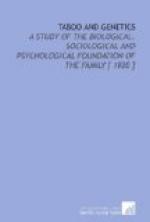Just as the holy thing, which is to be feared as the seat of a mystic, supernatural force, is to be avoided lest harm befall from contact with it, or lest it be denied by human touch and its divine essence be affected, so the unclean thing is also made taboo lest it infect man with its own evil nature. Even as the savage will not have his idol polluted by contact with his own personality, however indirect, so he would himself avoid pollution in similar fashion by shunning that which is unclean. Here also the avoidance of the tabooed person or thing is based on the principle of sympathetic magic understood as a method of transference of qualities, and on belief in the possibility of infection by contact.
The dual nature of taboo as the avoidance of both the sacred and the unclean is noted by authorities on the subject who differ in other respects as to the definition of taboo, such as in the relation of taboo to the magical ceremonies by which man undertook to mould his environment to his wishes. Whether the tabooed object be regarded in one light or the other, the breaking of taboo is associated with dread of the unknown—besides the fear of infection with the qualities of the tabooed object according to the laws of sympathetic magic. There is also the fear of the mysterious and supernatural, whether conceived as the mana force or as a principle of “bad magic.”
Dr. J.G. Frazer has collected into the many volumes of “The Golden Bough” a mass of evidence concerning the taboos of primitive society. On the basis of his definition of magic as “a misapplication of the ideas of association by similarity and contiguity,” Dr. Frazer divided magic into “positive magic,” or charms, and “negative magic,” or taboo. “Positive magic says, ‘Do this in order that so and so may happen.’ Negative magic or taboo says ’Do not do this lest so and so should happen.’"[4, p.111, v.I.]
But Dr. Frazer’s conclusion, which he himself considered only tentative, was not long left unassailed. Prof. R.R. Marett in his essay “Is Taboo a Negative Magic?"[5] called attention to the very evident fact that Dr. Frazer’s definition would not cover the characteristics of some of the best known taboos, the food taboos of Prof. Tylor to which we have previously alluded in this study, as a consequence of which “the flesh of timid animals is avoided by warriors, but they love the meat of tigers, boars, and stags, for their courage and speed."[3, p.131.] Are not these food taboos rather, Dr. Marett asks, a “misapplication of the ideas of association by similarity and contiguity” amounting to the sympathetic taboos so carefully described by such writers on Magic as MM. Hubert and Mauss of L’Annee Sociologique? Still another kind of taboos mentioned by Dr. Frazer but amplified by Mr. Crawley in “The Mystic Rose,” the taboos on knots at childbirth, marriage, and death, are much better described by the term “sympathetic taboo.” Moreover, if taboo were a form




